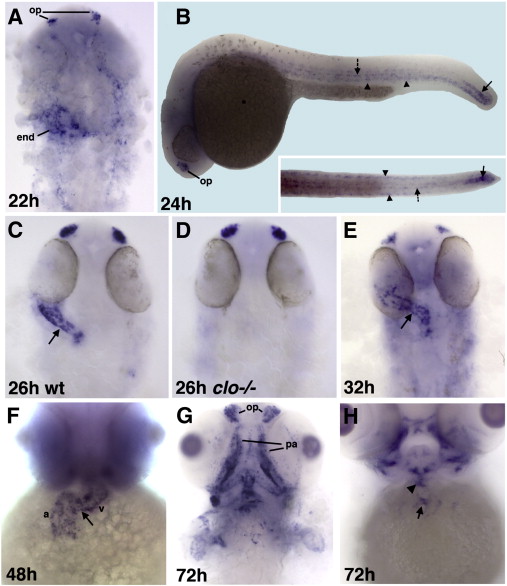Fig. 1
NFATc1 is expressed in the endocardial cells as analyzed by whole-mount in situ hybridization at 22–72 hpf. Dorsal view of flat-mounted embryos, anterior is to the top except as noted. (A) NFATc1 is expressed in the endocardial progenitors (end) and the olfactory placodes (op) at 22 hpf. Much fainter expression is also apparent in the cranial endothelial cells. (B) NFATc1 expression at 24 hpf includes olfactory placodes (op), bilateral subepidermal cells along the trunk (arrowheads), adaxial cells along the midline (dotted arrow), the most caudal part of the notochord and the tailbud (arrow). Lateral (the main panel) and dorsal views of the trunk and tail regions (inset). Endocardial expression is not apparent in these views. (C,D) Endocardial NFATc1 expression (arrow, C) is absent in clo-/- mutants (D) compared with their siblings in (C) as analyzed at 26 hpf. Approximately µ (16 out of 63) embryos obtained from heterozygous clo+/- carriers showed this phenotype. (E,F) NFATc1 expression throughout the endocardium at 32 hpf (E) and 48 hpf (F) (a, atrium; v, ventricle; arrow points to the atrioventricular boundary). (G,H) NFATc1 expression at 72 hpf includes the olfactory placodes (op) and pharyngeal arch skeleton (pa). NFATc1 is no longer expressed throughout the endocardium but is localized to the valve-forming regions in the atrioventricular canal (arrow, H) and the outflow tract (arrowhead, H).
Reprinted from Developmental Biology, 361(2), Wong, K.S., Rehn, K., Palencia-Desai, S., Kohli, V., Hunter, W., Uhl, J.D., Rost, M.S., and Sumanas, S., Hedgehog signaling is required for differentiation of endocardial progenitors in zebrafish, 377-91, Copyright (2012) with permission from Elsevier. Full text @ Dev. Biol.

